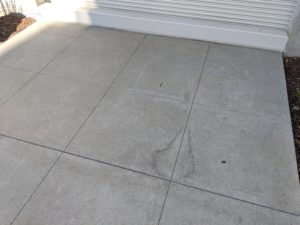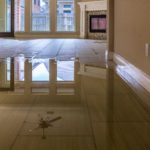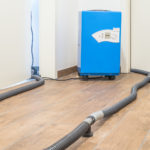A ‘slab leak’ is a term used to describe a water leak that has developed in the water lines beneath the concrete foundation.
Such leaks in the water lines are often a result of long-term corrosion, abrasion, foundation shifts, high water pressure, and poor installation.
Slab leaks can start from any point. They aren’t necessarily visible on the top, but since water finds the easiest path, it often hits the reinforcement.
When such leaks are present above ground, in the wall or ceiling, they are referred to as pinhole leaks.
Be sure not to ignore a potential slab leak. The longer you wait the more extensive & expensive the water damage will be.
Here are the top seven warning signs of a slab leak:

Warning Sign #1 of a Slab Leak: Puddles of Water
This one is among the most common slab leak symptoms.
Do you sometimes notice puddles of water on the floor or standing water around the perimeter of your house? Are you sure the water did not come from a hose or a dog bowl?
Well, you may have a slab leak.
Such puddles of water develop on the floor when water leaks underneath the wall/floor surface push water through the walls, cracks in tiles, and floorboard.
Unexplained water accumulation on top of any concrete surface indicates a potential slab leak, especially if it’s in close proximity to plumbing systems, water pipes, or drainpipes. Most slab leaks are found in areas in close proximity to kitchens, bathrooms, and utility rooms.
Carefully inspect the plumbing fixtures nearby. Use a flashlight, if necessary. Look for the signs of water damage or moisture as well as possible plumbing leaks.
If you are unable to troubleshoot or fix the problem, call in a professional plumber. It takes a specialist to find hidden water leaks around the foundation, behind the walls, on the roof, or in the basement walls.
Warning Sign #2 of a Slab Leak: Musty Odor
Slab leaks nearly always result in water damage. Even tiny pools of water between the walls, under the floorboard, or cracks in the concrete can promote mold growth when oxygen, moisture, and food sources are available.
The growth of mold and mildew remains undetected until the time you start noticing the musty, organic smell. The foul smell can help you identify the source of mold as well as the probable cause of the leak.
If the odor appears to be particularly strong near a damp area on the floor, it is possible you have a slab leak.
You should call a local mold remediation specialist if you think a possible mold infestation under the slab or between the walls is causing any allergic reactions or discomfort. An experienced local plumber can also help identify and fix the leak.
Warning Sign #3 of a Slab Leak: Cracks in the Foundation
Water is powerful. A water leak behind the walls or under the floor will eventually hit the foundation of your dwelling.
If you notice any cracks in the foundation, there’s a good chance you have a slab leak. At this point, slab leak repair can get expensive.
So, be sure to either tend to this issue personally or call your local plumber for a leak inspection on-site.
Warning Sign #4 of a Slab Leak: Running Water Sound
At times, a slab leak can be easily detected by listening to the sound of running water.
When you have a burst pipe or a major water leak under the foundation, you may hear sounds of running water underneath the floor.
A plumber can properly inspect the problem and determine the exact location of the leak.
Warning Sign #5 of a Slab Leak: Water Meter
Turn-off all your plumbing appliances, faucets, hoses, etc. in your home. Now, watch the water meter. If the meter-dial is still spinning, it’s possible there is a leak somewhere in your property’s plumbing system.
You can use this technique to validate if there is actually a water leak. Unusually low water pressure can also be a sign of a water leak inside a home. Other signs can help ascertain if it’s a slab leak.
In any case, a water leak shouldn’t be left unattended for long. Even minor leaks behind the walls or in the crawlspace, basement, and attic can ruin furniture, carpets, fabrics, belongings, and even the structure of your home.
Warning Sign #6 of a Slab Leak: Increasing Water Bill
It is a good idea to always monitor your monthly water bills. You can maintain a diary, create an Excel sheet, or use an expenditure tracker app.
Unusual spikes in your monthly water bill may indicate a water leak.
When you have a slab leak, your water bill can be much higher than it should be.
Warning Sign #7 of a Slab Leak: Hot Water Slab Leak
If you touch the puddle of water or the surface where you notice unexplained moisture and it’s hot, chances are that you are dealing with a hot water slab leak.
Hot water pipes running through your house are often hidden behind the walls, under the floors, and between the concrete.
What Should I Do If I Have a Slab Leak?
If you suspect you have a slab leak, call in a specialist for slab leak and repair.
Before you even plan to rip up your concrete slab, you have to be 100% sure of the location of the leak.
Even if you manage to locate the leak by observing the signs discussed above, you’d still need professional assistance to remedy the situation.
Fixing a slab leak isn’t as straightforward as using a jackhammer to reach the area underneath the concrete slab so that you can repair a burst pipe.
Professional plumbers can pinpoint a leak underneath a slab by using various methods and recommend fool-proof ways to fix it. A water damage restoration professional will restore the damage to the surrounding areas caused by the water leak.
To fix a slab leak, plumbers may recommend capping off old or damaged pipes using more durable and sturdy pipes.
In case the plumbing system is too old, complete pipe replacement may be necessary to prevent slab leaks in the future.


